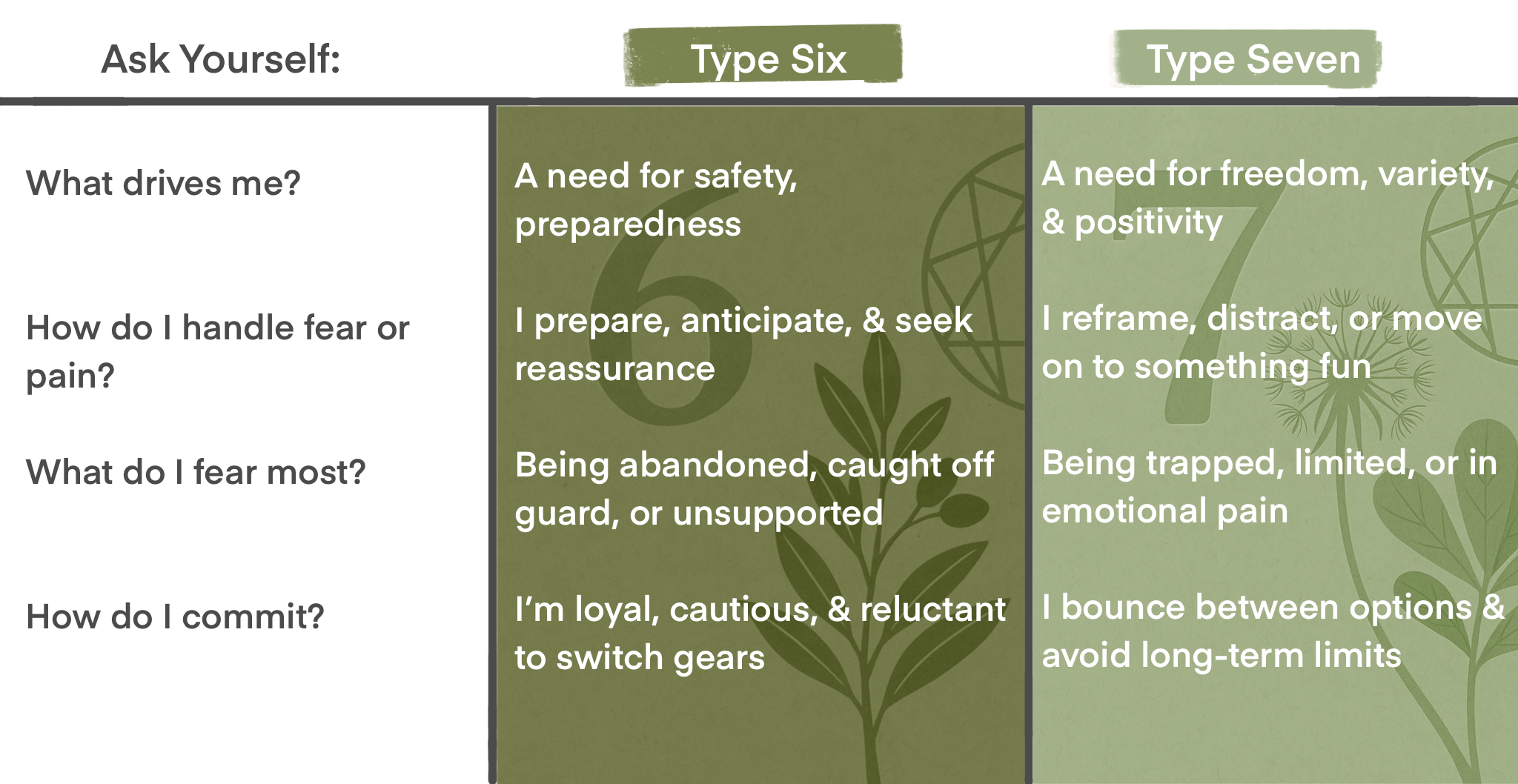In-Depth Comparison
Sixes and Sevens are both mental types who tend to overthink things, but that’s pretty much where the similarities end. While they may both seem active, curious, or even indecisive, their underlying motivations and coping strategies couldn’t be more different.
Type Sixes are preoccupied with uncertainty and risk. They want to feel prepared, protected, and anchored to something or someone they trust. Their mind often circles worst-case scenarios, and they’re known for their loyalty and caution. Even when they’re funny or social, there’s usually an underlying anxiety driving their need to plan ahead or scan for danger.
Type Sevens, on the other hand, want to keep life exciting and avoid pain at all costs. They tend to reframe negative experiences, keep moving toward the next exciting idea, and resist emotional discomfort. While Sixes try to feel safe by doubling down on duty and preparation, Sevens try to feel free by skipping town emotionally (or literally) before things get too heavy.
Sixes want security, and fear abandonment or chaos.
Sevens want freedom, and fear pain or limitation.
Sixes worry about what could go wrong.
Sevens distract themselves from what’s wrong.
Sixes can feel pessimistic or skeptical.
Sevens can feel overly optimistic or avoidant.
Sixes commit even when it’s hard.
Sevens may flee or distract when discomfort hits.
Ask yourself:
Do I try to avoid anxiety by planning and staying vigilant (Six), or by staying distracted and optimistic (Seven)?
Do I get stuck in worst-case thinking (Six), or race ahead to best-case fantasies (Seven)?
Quick Spot-the-Difference Table
Special Considerations & Deeper Theory
Same Intelligence Center: Head / Thinking Center
Both Sixes and Sevens are in the Head Center, which means they process the world through thinking, planning, and anticipating what’s next. However, they respond to anxiety in opposite ways:
Sixes orient toward potential danger, scanning for threats and preparing for worst-case scenarios.
Sevens orient away from discomfort, quickly reframing or moving on to avoid pain or limitation.
So while both can seem fast-thinking and future-focused:
Sixes try to manage anxiety by preparing for it.
Sevens try to escape anxiety by avoiding it altogether.
Relational Stance: Dependent vs Assertive
Sixes are in the Dependent Stance, referencing others or trusted systems to make decisions and feel secure.
Sevens are in the Assertive Stance, pushing forward with confidence and initiating action based on their internal vision.
This creates a difference in energy:
A Six says, “Let me check.”
A Seven says, “Let’s go.”
Shared Traits That Create Mistyping
Both types can be outgoing, witty, and mentally agile, engaged in multiple activities or plans, prone to anxiety or scattered thinking, but:
Sixes doubt and hesitate.
Sevens avoid and distract.
Mistyping often happens in:
Phobic Sixes who appear hesitant and loyal but are outwardly upbeat or talkative
Sevens who have been socialized to be more responsible, loyal, or systems-oriented (especially social subtype Sevens)
Stress & Growth Paths Offer Clarity
Sixes go to Three in stress, becoming more image-conscious, competitive, or performance-driven, sometimes resembling a more focused Seven.
Sevens go to One in stress, becoming more rigid, critical, or perfectionistic, very different from a typical Six’s anxiety pattern.
Sevens go to Five in growth, becoming more focused, thoughtful, and depth-oriented, traits that can resemble a grounded or more cautious Six.
Subtype & Wing Confusion
A 6w7 may appear cheerful, spontaneous, and enthusiastic, easily mistaken for a Seven who’s unusually loyal or security-minded.
A 7w6 may appear dutiful, socially conscious, and invested in relationships, easily mistaken for a more energetic or playful Six.
Social subtypes of both types may emphasize belonging, loyalty, and group energy, which can blur distinctions even further.
Common Mistyping Pitfalls
You might think you're a Seven if you're a Six who copes with fear by staying busy, upbeat, or chasing new ideas to stay ahead of worry.
You might think you're a Six if you're a Seven who values loyalty, works in service or caregiving roles, or has learned to mask fear with humor and action.
Both types may feel chronically anxious, but Sixes stay with the fear to control it, while Sevens outrun it to avoid it.
Reflect & Explore
Do I try to calm fear by controlling the situation (Six) or escaping it entirely (Seven)?
When I’m feeling stressed, do I lean into loyalty and plans (Six) or look for a quick distraction (Seven)?
Do I feel more stuck in anxiety loops (Six) or avoidance patterns (Seven)?

